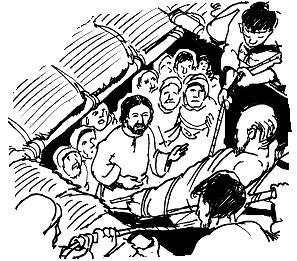
“When Jesus saw their faith, he said to the paralytic, ‘Child, your sins are forgiven.’” (Mark 2:4).
Mark’s version of the healing and forgiveness of the paralyzed man lowered through the roof illustrates the power of heaven and earth coming together in Jesus. His Incarnation unites divinity and humanity, making what were formerly seen as exclusively Godlike powers now available to human beings. For God is no longer distant in heaven; God is among us, active in our relationships.
The first sign that something more than just a human effort is occurring here is that the roof of the house is opened up to make it possible for the paralyzed man to come to Jesus. This repeats the image of the sky opening at Jesus’ baptism to unite heaven earth in him, called by the voice of God "my beloved Son." This is what makes possible the full restoration to wholeness for the paralytic.
So that the full meaning of the miracle can be revealed, Jesus says, “Child, your sins are forgiven.” Spiritual liberation will precede physical healing. This claim stirs objections in some of the scribes who witness the scene. “Only God can forgive sins,” they say among themselves. Jesus is uttering blasphemy.
Jesus answers them saying that “the Son of man has power to forgive sins,” or, in other words, that human beings can forgive one another. Ritual sacrifices or some words that only special representatives of God can pronounce are no longer needed. Ordinary people of faith, like the friends who carried the paralytic to Jesus, are initiating this miracle. Jesus sees their faith and knows that healing is possible. Their faith is saving the man they are carrying to God with such love.
How might we understand Jesus’ words that human beings (the” sons of men”) have the power to forgive and heal? Just as certain forms of paralysis occur in communities and families because of fear, criticism, the refusal to forgive, binding people up with resentment, grudges and self-doubt, so can people release one another with mercy and reconciliation. The paralyzed man is first called back to life by God’s mercy, and then he is able to stand up, pick up his life again and return to his family and community as whole.
Because God is not distant or inaccessible, but right here with us, among us and in us, all things are possible. Who is waiting in our lives to be set free today, and how can we do our part to bring them to God with love?








